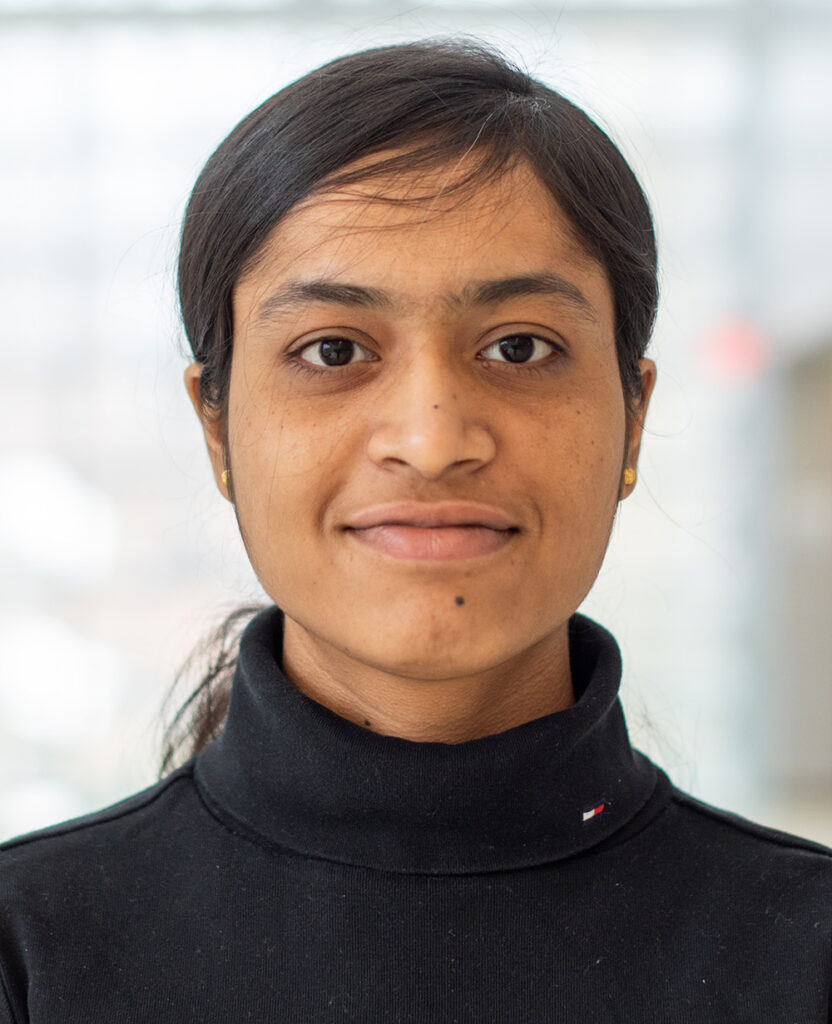Anjali Devi Sivakumar awarded Barbour Scholarship to support her research on analytical wearables for health monitoring

Anjali Devi Sivakumar, PhD student in ECE, was awarded a Barbour Scholarship from the U-M Rackham Graduate School for her research on developing wearable devices for continuous health monitoring through insensible sweat.
Insensible sweat (i.e., body odor), rich with valuable biomarkers and metabolites, shows immense potential as a diagnostic medium. It is often overshadowed by its more accessible counterpart, sensible sweat (i.e., thermal sweating – liquid sweat produced predominantly by sweat glands). However, the continuous and dynamic nature of insensible sweat positions it as an excellent candidate for integration into wearable diagnostic systems.
“In recent years, there has been a significant upsurge in the popularity and emphasis on utilizing wearable diagnostic devices for continuous health monitoring,” stated Sivakumar. “I am developing wearable analytical devices tailored for the investigation of insensible sweat and its medical significance across various diseases.”
The first part of Sivakumar’s research involves developing a wearable hygrometer-based transepidermal water loss (TEWL) measurement device that has applications in tracking food allergies and diagnosing dermatological conditions.
I am developing wearable analytical devices tailored for the investigation of insensible sweat and its medical significance across various diseases.
Anjali Devi Sivakumar
Today’s commercially-available TEWL devices are susceptible to external factors like ambient temperature, humidity, airflow, and water accumulation. These devices also rely on factors like the initial water content on the skin’s surface and are often bulky, expensive, and require controlled environments. Sivakumar’s research, on the other hand, introduces a wearable closed-chamber hygrometer-based TEWL device, the Wearable Analytical Skin Probe (WASP), along with an associated algorithm for accurate and continuous monitoring of skin water vapor flux.
The WASP device offers numerous clinical and non-clinical applications, from early detection of health conditions such as food allergies and common skin disorders, to monitoring sensible sweat rates in sports and measuring skin dehydration-rehydration for the cosmetics industry. Sivakumar will be collaborating with clinicians at Michigan Medicine to evaluate its usefulness for early food allergy diagnosis and for the study of various skin diseases.
The second part of Sivakumar’s research is focused on developing a state-of-the-art, low-power, low-cost wearable micro-gas chromatography (GC) device, approximately the size of a smartphone, to analyze the volatile organic compounds (VOCs) in the insensible sweat. She is collaborating with clinicians across various departments in Michigan Medicine for this research. To extract clinically relevant information from the body odor and the vital signs data she will also be collecting, Sivakumar will be collaborating with the data scientist team at Max Harry Weil Institute for Critical Care Research and Innovation to develop algorithms based on machine learning and artificial intelligence methods.
“Anjali’s research is highly interdisciplinary and challenging, involving engineering, analytical chemistry, biochemistry, microfabrication, physics, and biomedicine,” stated Xudong (Sherman) Fan, the Richard A Auhll Professor of Engineering in the Dept. of Biomedical Engineering. “Her exceptional creativity, innovation, and dedication will undoubtedly make her a future leader in interdisciplinary and translational research frontiers.”
Sivakumar hopes that the devices she is developing will improve healthcare accessibility and enhance preventive healthcare measures, even in the most remote regions.
Sivakumar received her bachelor’s degree in Electronics and Instrumentation Engineering from the SASTRA Deemed University in India and her master’s degree in Electrical and Computer Engineering from the University of Michigan. Before embarking on graduate studies at Michigan, she was a research assistant at Harvard Medical School for nearly two years. There, she received a Research Excellence Award.
As a graduate student, she has co-authored two potential patents, which have been licensed to third-party companies, and four peer-reviewed publications. She is a member of the honors societies Tau Beta Pi and Eta Kappa Nu. As Outreach Officer for GradSWE (Graduate Society of Women Engineers), Sivakumar leads initiatives to conduct STEM workshops for local Girl Scout troops. Sivakumar is co-advised by Prof. Xudong (Sherman) Fan and Prof. Zhaohui Zhong.
 MENU
MENU 
